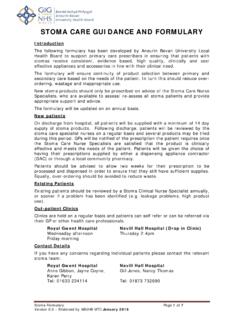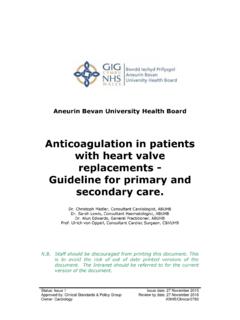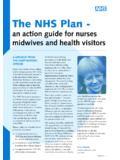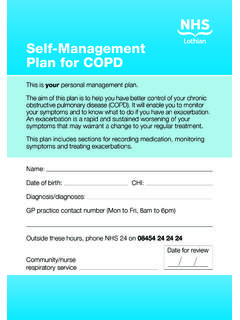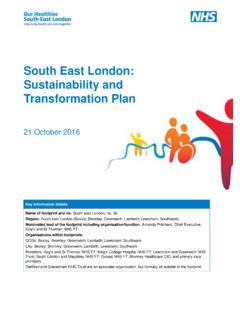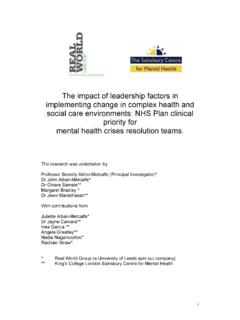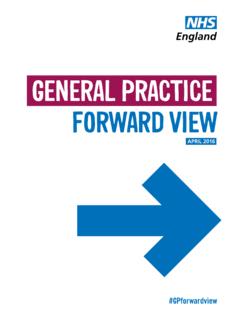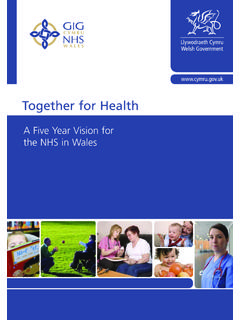Transcription of Together for Health: Eye Health Care - NHS Wales
1 Together for Health : Eye Health CareDelivery Plan for Wales , 2013 2018 Print ISBN 978 1 4734 0246 1 Digital ISBN 978 1 4734 0247 8 Crown copyright 2013WG16492 Printed on recycled paper Contents A joint foreword by the Minister for Health and Social Services and the Deputy Minister for Children and Social Services 1. Overview and strategic context 1 2. Vision and key priorities 2 3. What we have achieved so far 3 4. What will eye care services will look like in 2018 5 5. Key themes 7 Raising awareness of eye Health and the need for regular sight tests. Early detection of eye Health and sight problems. Providing access to high quality, integrated services and support.
2 - Primary and community services - Specialist hospital services - Supporting people with sight / dual sensory impairment 6. Making it happen 26 287. References Joint Foreword Mark Drakeford AM, Minister for Health and Social Services Gwenda Thomas AM, Deputy Minister for Social Services Improving services for people with poor eye Health and sight loss has been high on the agenda in Wales ever since the National Assembly came into being. As a result Wales has established a strong reputation in the development and provision of eye Health care services. Yet, even today, estimates suggest that in half the cases reported complete sight loss could have been avoided. That is why this plan is so important.
3 It commits the Welsh Government, again, to improve eye Health and ensuring there is a high quality care and support for those people with poor eye Health and sight loss. We need to ensure more people have regular sight tests and that eye Health problems are detected early. People need to know where they can access services, care and support in their local area and also be assured they will have rapid access to services and support when they need it. This Eye Health care Delivery Plan sets out a range of key actions to improve the eye Health of all children and adults in Wales , with specific, targeted support for those most vulnerable to eye Health issues and sight loss. The Plan focuses on opportunities for Health Boards and Local Government to work with the Third Sector and other partners to plan, co-ordinate and deliver services for people living within their local communities.
4 We are confident that we have the infrastructure and a highly qualified and motivated workforce which can provide a strong foundation for the next steps forward in securing high quality eye care services, care and support for the people of Wales . 1 1. Overview and strategic context Together for Health and Sustainable Social Services: A Framework for Action set-out the Welsh Government s ambition to help achieve the best in Health and wellbeing for each person in Wales . The Eye Health care Plan supports this ambition and outlines a programme of work to help improve eye Health and to ensure there is high quality care and support for those people with poor eye Health and sight loss. Wales has established a strong reputation in the development and provision of eye Health care services.
5 The UK Vision Strategy and the development of the Wales Vision Strategy Implementation Plan provided a basis for discussing the development of services and support with stakeholders within Wales . This Eye Health care Plan incorporates some of the key outcomes and priority actions from the UK Vision Strategy 2013-2018. The purpose of the Eye Health care Plan is to build on this progress, to ensure delivery of high quality, services, care and support for people across Wales . This will be achieved by developing new ways of working and greater collaboration both within the Health sector, between primary and secondary care and with local government and the third sector. Poor eye Health is a common and growing issue.
6 Currently nearly 100,000 people in Wales are living with sight loss. By 2020, this is predicted to increase by 22 per cent and double by 2050 (1). This significant 2 increase in people with eye Health problems is related to the ageing population, as around 75 per cent of sight loss occurs in people aged 65 or over (2). As the population ages, the incidence and prevalence in key underlying causes of sight loss increases, so eye Health problems and sight loss will become much more prevalent in the future. Over 50% of sight loss can be prevented through early identification and intervention (3). Early identification is also essential because sight loss has such a dramatic impact on wellbeing. The risk of depression and falls is over 2 times greater amongst elderly people with low vision (4, 5), when compared to those with normal sight.
7 Sight loss is also a risk factor in loneliness and isolation. This document therefore focuses on the opportunities for Health Boards and Local Government to work with the Third Sector and other partners, to plan, co-ordinate and deliver services, care and support for people living within their local communities. It sets out a range of key actions to improve the eye Health of all children and adults in Wales , with specific, targeted support for those most vulnerable to eye Health issues and sight loss. 2. Vision and key priorities Our vision is to develop high quality, patient focused, integrated services to improve the eye Health of people living in Wales , so they can benefit from better sight throughout their life.
8 For those who develop sight 3 impairment, we want to ensure they receive appropriate care , support and rehabilitation. Our key priorities are: Preventing avoidable sight loss and improving eye Health . Early identification of poor eye Health and sight problems. Providing high quality, efficient, accessible services. Ensuring integration of services and patient focussed delivery. Providing care and support for people living with sight/dual sensory impairment. 3. What we have achieved so far Although this is the first Eye Health care Plan for Wales , Welsh Government and partners have been pro-active in the development of eye Health care services and much has already been achieved. In 2002, the Welsh Eye care Service (WECS) was launched.
9 This aims to preserve sight through the early detection of eye disease and to provide support to those who have low vision and whose sight is unlikely to improve. As a result: Developments have enabled optometrists to manage two thirds of patient eye problems safely and effectively in the community, when previously they would have been required to refer them to hospital services. 4 The Low Vision Service Wales (LVSW) now provides rehabilitation for people who are losing their sight. It is based in over 180 optometry practices in Wales , has waiting times of less than 2 weeks and has been shown to be as effective at reducing disability as the 19 hospital based services operating eight years ago. Extended eye Health examinations are available in most optometry practices to those at high risk of developing eye disease such those from an ethnic minority or with a family history of glaucoma.
10 WECS is supported by Focus on Ophthalmology (FOO) which was launched in 2009. This aims to make the patient care pathways for unscheduled care , glaucoma and macular degeneration more patient centred and efficient. It encourages better collaboration between primary and secondary care professionals to improve the diagnosis, treatment and on-going care of patients. At the centre of this initiative is the development of Ophthalmic Diagnostic and Treatment Centres (ODTCs) in every Health Board. ODTCs are facilities where selected patients may be seen and managed by non-medical staff, with oversight and quality assurance provided via an ophthalmologist, with access to the electronic patient record, in a virtual clinic environment.
